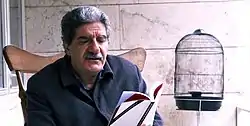Mohammad Hanif | |
|---|---|
 Mohammad Hanif reading out from one of his novels. (2015) | |
| Born | 1961 Boroujerd, Iran |
| Nationality | Iranian |
| Alma mater | Kharazmi University |
| Known for | Novelist, Literary Critic, and Researcher |
| Notable work | With Hard Labor (2019), Localization of Magical Realism in Iran (2016) |
Mohammad Hanif (born 1961) is an Iranian novelist and scholar. He is the winner of many national awards including the prestigious Iran's Book of the Year Awards, Jalal Al-e Ahmad Literary Awards, Golden Pen Award.[1][2][3]
Life
A few years after 1979 Revolution, he started his career as a country schoolteacher. However, soon he was fired from his job due to unfounded political charges.[4] Then he entered Kharazmi University to study history, but literature, as well as creative writing, remained a priority for him.[5] His specialty in history encouraged him to write extensively on Persian folklore and also made him one of the few Iranian novelists using magic realism in his novels: an approach particularly evident in his later works, e.g., The Magical Hat and Copper Statue (novel), That Man Smelled Death Since Then (novel), With Hard Labor (novel) and Localization of Magical Realism in Iran (research).[6][7] He is now mainly focused on fiction.
Fiction
- With Hard Labor (2019)
- Gupta's Magic (2018)
- That Man Smelled Death Since Then (2017)
- The Magical Hat and Copper Statue (2012)
- The Cage: Life in a Prison Camp (2009)
- The Dreams of Deer (2008)
- Icy Flowers (1998)
See also
References
- ↑ "نامزدهای مرحله اول جایزه واو معرفی شدند - خبرگزاری مهر | اخبار ایران و جهان | Mehr News Agency". mehrnews.com. Retrieved 2021-11-17.
- ↑ "اعلام اسامی نامزدهای بخش نقد و پژوهش نوزدهمین جشنواره قلم زرین - خبرگزاری مهر | اخبار ایران و جهان | Mehr News Agency". mehrnews.com. Retrieved 2021-11-17.
- ↑ "نامزدهای بخش "رمان" جایزه ادبی جلال آل احمد معرفی شدند - ایرنا". irna.ir. Retrieved 2021-11-17.
- ↑ "news/view/462/index". elmifarhangi.ir. Retrieved 2021-11-17.
- ↑ "news/view/534/index". elmifarhangi.ir. Retrieved 2021-11-17.
- ↑ "وب سایت اهل قلم". Ahleghalam. Retrieved 2021-11-17.
- ↑ "The influence of the Safavid' folktales on social life of modern Iranians :: COBISS+". plus.si.cobiss.net. Retrieved 2021-11-17.